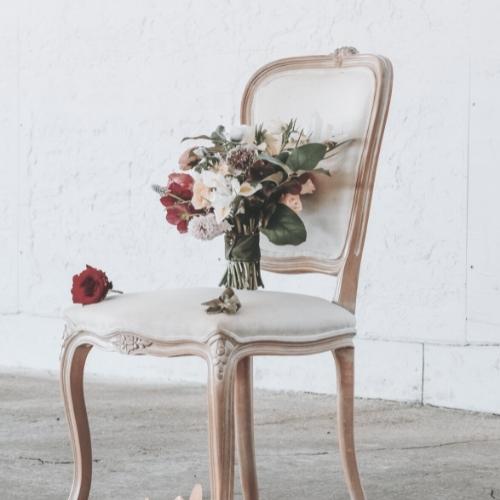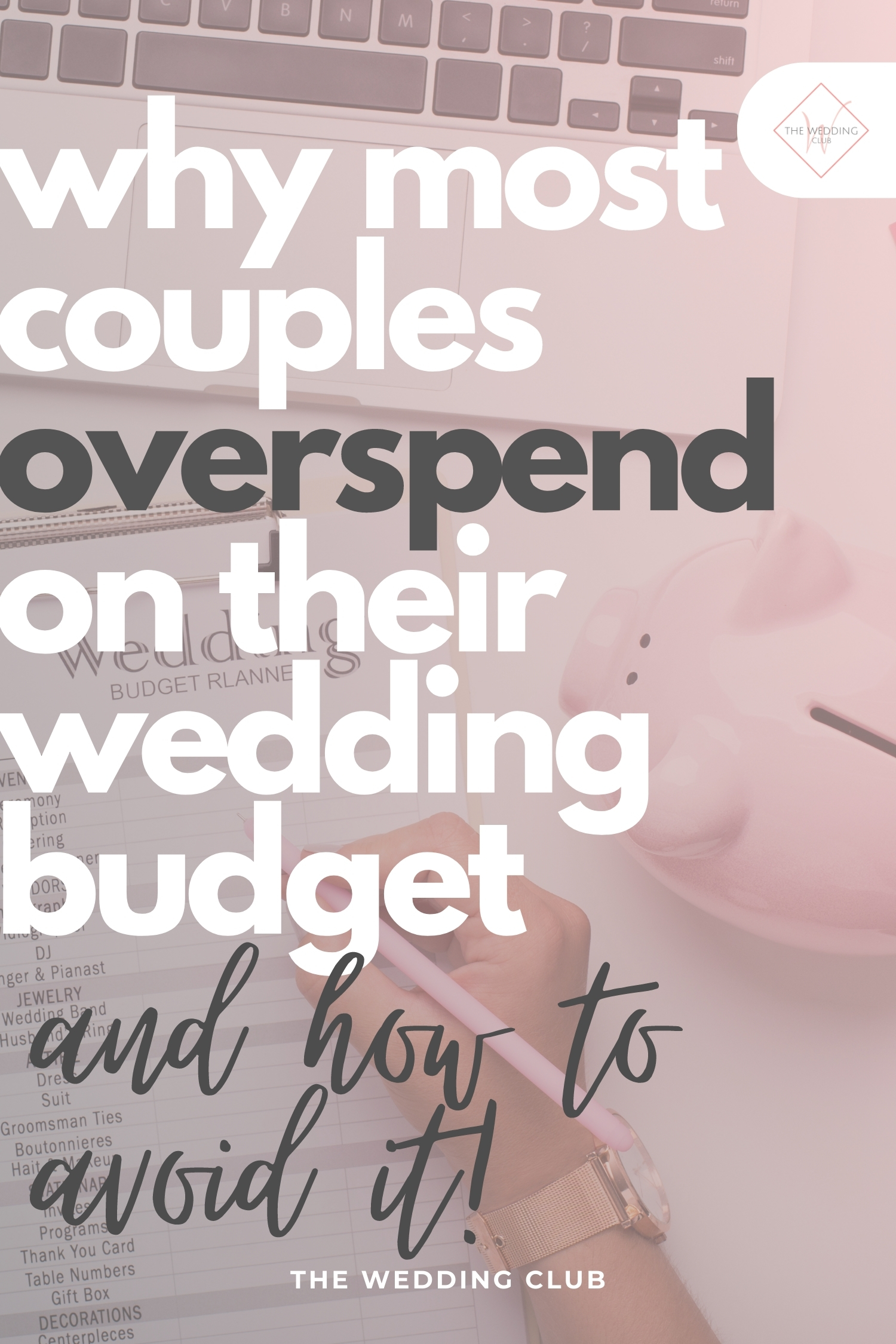One of the greatest challenges in planning your own wedding is to not overspend when it comes to your wedding budget – and most couples have difficulty when it comes to this.
Your life which you will build together after the wedding will require certain finances, such as a house, a new car or maybe even a baby. If you overspend on your budget for your wedding day, you might have a difficult time to recover or repay your debt.
If you have a comfortable budget with which you can plan your special day, this shouldn’t be an issue. The reality is that most of us have limited budgets to plan a dream wedding.
In this post we will look at the reasons why you will likely overspend, and how you can avoid it.
Why Most Couples Overspend on their Wedding Budget – and how to avoid it!
Why Couples overspend in the first place
Let’s have a look at some of the reasons why many couples go over their budget, only to regret it afterwards…
All the things
When you start planning your wedding, and you are like most of us, you can easily get “shiny object syndrome” (Objectivius Shinium Syndromus)… You become attracted to all the shiny things! Wedding decor, flowers and styles all provide hours of browsing and pinning on Pinterest.
This is when it can become difficult to decide what you really want at your wedding, and many brides make drastic decisions to simply hire in expensive decor items and things, even if it’s on their own personal account. This is where the overspending begins: every underplate, favor box, rose gold candelabra, etc. costs extra per item – and multiply each item by the number of wedding guests or tables you are planning to have… Ka-ching!
Also read: 23+ Wedding Stuff that will DESTROY your bank account!
Limited budget
Another reason why many couples overspend is because they have a limited budget. Do you know how hard it is to stick to a budget, especially when you are trying to plan your dream wedding?
After realizing what still needs to be booked, hired and paid before the wedding, it may already be too late to stick to a limiting, or small, budget – and this is where many people start to look at their own personal finances to cover wedding costs. Pair a limiting budget up with poor planning and you might have a very uncomfortable situation on your hands…
Necessities at your wedding
The sobering fact is that weddings are becoming more and more expensive. Nowadays, even the cheaper options and DIY wedding stuff are starting to get the wrong price tags, too!
With this in mind, there are still stuff you definitely have to have at your wedding – such as the dress, a venue, food for your guests, a photographer, and so on… The best way to approach all of this is by making a list of things you definitely need at your wedding.
If you have a small budget, this is where the hard part comes in: trying to cut costs on things which you really need at your wedding. And this is also where most couples overspend, because the budget barely covers the necessities – what about decor, flowers, favors for guests, and so on?
Not striking through
We get that you want to share this special day with all of the family and friends, and even colleagues in your life. But each person costs extra at your wedding. For each guest, you need a chair, underplate, tableware, a favor, an escort card, wedding invitation and other stationery… oh, and a plate of food.
There are so many couples which we know of that will invite nearly everyone they know – from direct family and friends, to friends of friends, acquaintances and work colleagues. Sooner or later, they will realize that they went over the budget with their guest count, and forget something such as the wedding transport for the bride!
Not having a budget in the first place
This is a major pitfall in overspending on your wedding budget! There are so many people that just want to “wing it” when it comes to their wedding planning.
The truth is: if you don’t have a budget it place, you will overspend! And we feel depressed thinking about all of those bills and debt afterwards, which couples still pay off 10 years after their wedding day…
Do the smart thing and have a proper budget in place – you can view our Wedding Budget Planner Kit here, if you need some help with this.
Lack of thorough and proper planning
The final reason why most couples overspend on their wedding budget is because of a lack of planning for their wedding. Sometimes, this happen because they think they still have time to plan a wedding, or because they think there are still enough money left in the budget.
Or, they get so preoccupied with their personal stuff or at work, that they don’t have the time needed to plan a successful wedding.
Also Read: How to plan a wedding on a small budget
How to work out a budget that suit your needs
Budget basics
- When having your first budget discussion, it is important to decide on a grand amount to work with. From there, you can break this amount up into smaller amounts to allocate to different areas in your wedding planning.
- Operate from one account. It makes it more challenging to see how much money is used when working from more than one bank account – also, you will be more likely to overspend when you use different accounts.
- Put someone in charge of budget handling. If you know you are prone to shopping and spending money, why not ask someone to help you handle all the budget expenses. This person should be extremely reliable and trustworthy, like a family member perhaps.
Budget breakdown
Each wedding budget is different. One couple may decide to spend more on food and wedding favors, and another couple may want to spend more on the DJ and photographer than food. So, we cannot exactly tell you how to break up your wedding budget into sections. We do, however, have recommended percentages which we work with – this is only used as a guideline. But let’s look at the different sections first:
- Venue expenses
- Staff hire
- Ceremony flowers and decor*
- Pre-reception flowers and decor*
- Reception flowers and decor*
- Music and lighting
- Photography and videography
- Cake
- Food and drinks
- Wedding wear and apparel
- Hair, makeup and beauty
- Gifts and favors
- Wedding stationery
- Transportation
- Other expenses
*flowers and decor for different aspects of your wedding can be grouped as one expense. Though ceremony flowers and decor are normally cheaper than the reception flowers and decor. Pre-reception flowers and decor includes those used on the cocktail tables, welcome drinks table, harvest table, etc. during the hour interval between the ceremony and reception.
Recommended percentages for the wedding budget breakdown (guideline only – change the percentages up to suit your personal wedding budget needs):
Note: these percentages are based on an average wedding budget of $30,000. You should adjust your percentages depending on your wedding budget amount.
- Reception venue = 8%
- Ceremony venue = 1%
- Photographer = 6%
- Videographer = 5%
- Food and drinks = 30%
- Cake = 2%
- Wedding stationery = 4%
- Wedding wear and apparel = 10%
- Hair, makeup and beauty = 3%
- Flowers and decor = 5%
- Music and lighting = 7%
- Gifts and favors = 2%
- Transportation = 2%
- Other expenses* = 15%
*Other expenses includes all of the extras which you have to budget for, including accommodation, and your honeymoon if that is part of the budget. Remember to include a little extra in your budget for unexpected wedding costs.
Cut through!
Finally, after you have worked out your wedding budget, you can now view all of the expenses you might possibly have. From here on, you can easily add or remove items from your list, or replace things with cheaper options.
Keep using your budget throughout your entire wedding planning process, and remember to have a look at it every now and then to see where you stand with your finances. Keep updating your budget after you pay for different things for your wedding.
How to avoid overspending on your wedding budget
Get into the budgeting routine
Working with a budget, in life and in wedding planning, can become a daunting task. It is difficult to stick to a budget and it takes a while to form a decent budgeting routine or habit.
However, in order to prevent yourself from overspending on your wedding budget, you need to form a wedding budget habit. There are many ways in which you can form a new budgeting habit, but we recommend the following tips:
- Choose a weekly budget day. Having a certain day every week on which you focus on the budget will help you to track your budget regularly.
- Print your budget out and put it in a place where you will see it often. This will help you to look at your budget more often.
- Color code your budget to make it more interesting. For instance, have a color for each section of your budget – yellow for reception, green for gifts and favors, and so on. You will be more interested in working with your budget in this way. (our Wedding Budget Planner Kit comes in pastel colors, ready for you to print out and use.)
(Rosemary Groner from The Busy Budgeter has a great collection of articles on budgeting, which you might find useful when planning out your wedding budget.)
Work with a wedding checklist
It is so important to have a wedding checklist in place. On this checklist, you should include every little detail that forms part of your wedding planning. From cake tasting dates, dress fittings and makeup trials, to groomsmen suit fittings, meeting the pastor, and so on. Everything should be included!
After you have your checklist in place, create a timeline that works with the checklist. You can also write due dates next to each item on your checklist, so that you know when to plan what for your wedding day. (If you need some great tools to plan your wedding day, you can check out The Knot)
Make time for actual wedding planning stuff
We get that people are busy. With their job, their life and their family. But you need to actually make time to plan your wedding. You will have to make time to contact and meet up with suppliers, go for dress fittings and makeup trials, etc.
Don’t forget to delegate tasks to your bridesmaids and encourage your fiancée to do the same with his groomsmen. That’s what they are there for!
Also, never turn down extra help when family members and friends offer it. You will need all the help you can get in the end…
Don’t have any time to plan your wedding? Then you should definitely consider hiring a wedding planner for your big day. Before you choose one, you should read this article first on how to spot the wrong wedding planner (includes a FREE checklist to compare multiple wedding planners)… You definitely don’t need the additional stress when it comes to planning your special day!
Don’t ignore money saving tips!
A bride never wants her wedding to look cheap or low budget. However, there are many ways in which you can save money on your wedding day, either by DIY-ing things, going for cheaper alternatives, or excluding things from your wedding altogether.
Do some research. You will find that there are hundreds of great tips to save money. Don’t just wing it and think “I guess this is what it costs…”. Make the effort to find cheaper alternatives to everything, without compromising the quality, of course.
And, if you find that something is “only a little bit cheaper” than what you actually want, go for it. In the end, all of the small differences in prices will add up and you will save more money on your wedding than you imagined.
Have a separate account for your budget
We have mentioned this earlier in the article, but it is worth mentioning again. Having a single account from which you pay all of your wedding expenses will help you to keep better track of everything. It is difficult to manage multiple account for a single wedding budget.
Also, if your parents are contributing, ask them to transfer their total amount to your wedding account to make handling of payments easier. For example, if your parents offer to pay half of the venue costs, you will all have to make separate payments which might turn into an admin issue on the venue’s side.
This goes the other way around. If you rely on your parents to help your manage the wedding budget, why not talk to them about having a separate account in which everyone can contribute to?
Book and pay the most important things first
Couples mainly overspend when it comes to the smaller, less important things for the wedding. Stuff like décor and gifts, or “nice-to-haves”.
To avoid having to go over your budget for more important things, pay for them first. All the must-haves, such as the venue, dress, food, music, pastor, photographer, etc. should be at the top of your budgeting list. Book and pay these first, to avoid some unwanted debt after the wedding.
DIY everything that can be DIY-ed!
Pinterest is full of great DIY wedding ideas, and you can make a lot of things for your wedding day yourself. Why not host a DIY party with your bridesmaids, on which you can create some stuff. Wedding stationery, décor items, favors and activities are only some of the things on your wedding DIY list!
A side note: Sometimes, items needed to create DIY wedding things can add up to be more expensive than hiring or buying the real thing. Always do you research before taking on a DIY wedding project.
Another side note: Time can also be a factor. Making stuff for your wedding can be time consuming. Take this into consideration when you decide to fold 1001 paper cranes or making 100 wedding favors… Also be aware of how much time you have left before the wedding.
Also Read: 19+ Ways to save money on your wedding
There are so many ways to avoid overspending on your wedding budget, but the main tip we have that stands out above the rest is: Have a wedding budget in place!
Need a printable wedding budget template? Have a look at our latest version over here!

by Tanya Guilfoyle
Born in Johannesburg, South Africa, Tanya has been an active contributor and planner in the wedding industry since 2016. When not writing useful content for brides and wedding professionals, she can be found designing templates for her Etsy shop, TWCprintables.



